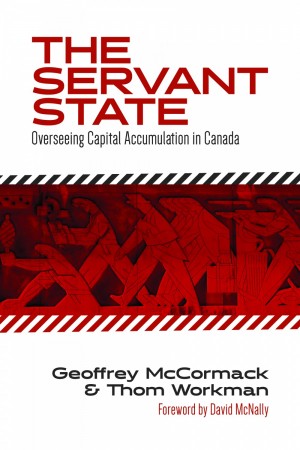Like this article? rabble is reader-supported journalism. Chip in to keep stories like these coming.
The Servant State: Overseeing Capital Accumulation in Canada explores Canada’s experience through the 2008 economic meltdown and challenges several widely held illusions about the country. It is the first collaboration between Geoffrey McCormack who teaches at Wheelock College in Boston and Thom Workman who teaches at the University of New Brunswick in Fredericton.
In January of 2016, I spoke to both authors about their book.
Your book has been described as a “game changer.” You make it very clear that this work represents a departure from a good portion of “mainstream” critical analysis. In what way is this book a unique contribution to the discussions about Canada’s recent past?
On the research side of things we employed an analytical framework straight out of Marx’s Capital. We assumed that there is an impermeable core centred on the “laws of value” that governs the evolution of capitalism in Canada. These laws of value, in turn, explain why there is a tendency for capitalist economies to lapse into crisis or to be “crisis riven.” Such laws do not explain everything, but they tend to explain a lot, especially over the longer term.
We believe that Marx’s critique of political economy is better than any other one advanced since Adam Smith. But, as we also say, the theory does not “pretend to detail each frothy brush with white water before the waterfall’s edge.”
Far from isolating yourselves in a “theoretical bubble” you jump right into the data. Can you comment on this?
The question implies a sharp distinction between “the theoretical” and “the empirical.” We tend to see the transition from the theoretical to the empirical in a more seamless way. Marx’s theory gently instructs us to examine such things as the rate of corporate profitability.
To be sure, in Canada, capital had been enjoying relatively strong rates of corporate profitability from the early 1990s up to 2005. And even the slight downturn in the rate of corporate profit in 2005 did not significantly undercut the growth of the mass of profit. So, investment up to the 2008 crisis was strong. Growing profits and strong capital accumulation before the crisis was reflected in both a healthy financial sector and a healthy industrial sector.
The Canadian economy, in a nutshell, was strong going into the crisis, a fact which helped it weather the Great Recession as well as any other country. Canada was not stung by the global downturn to the same degree as other countries. Of course, politicos have crawled over each other to take credit for Canada’s economic durability since 2008, but the real explanation had to do more with corporate profitability.
In Chapter 4 you talk about austerity and provide a dense empirical study of wages in Canada. You argue the post-WWII era of “social democracy” was basically a chimera. Why do you see continuity here despite apparent change?
We assert that the continuing austerity measures reflect the continuity of the Canadian capitalist state. Austerity gives us nothing new! We assume that post-WWII social and economic policies are really about preserving the coercive nature of the labour market, and much less about fostering greater justice for the working class.
Recent austerity measures — especially to the extent that they sharpen the likelihood that workers will be forced to take a crappy job just to eke out a living — do not represent a sharp break with Canada’s past.
Labour laws are revised, welfare programs gutted, unemployment relief scaled back and so forth all for the same reason: crappy jobs! Unionization levels decline and the incidence of strikes continues to decline both with the same effect: crappy jobs! “Work or fall on hard times!” is sadly an axiom as true now as it has ever been.
Austerity in Canada ensures that working families work more, moonlight more, save less and get into financial distress more frequently. Nothing that justifies the feverish optimism recently associated with the change in incumbent governments: “Canada is back” is a puzzling idea if we realize that the prospects for working people are not about to palpably improve.
In the book, you claim that the left often situates its analysis and criticism of capitalism within a moral framework. Do you see this as a problem?
Of course, we are appalled by the obscenities of capitalism and the Canadian state. But the left needs to move beyond mere indignation. In order to confront a horrifying world, one must first understand it.
So, socialism is not just a matter of running with one’s “gut feeling” but actually hinges on developing a sophisticated understanding of capitalism and its inherent problems?
Yes — absolutely! Capitalism is not sustainable, it is always prone to crisis, just as it is as likely to generate continual poverty and war. The left in Canada needs to centre the irredeemable nature of capitalism. It needs to acknowledge that over the long term there is not an accommodation to be reached with capitalism. The left in Canada, we might say, must move more to the left.
This book interview originally appeared on NB Media Coop and is reprinted with permission.
Chris Walker is a graduate of Athabasca University’s political economy program. He is currently pursuing graduate studies in theology. He is interested in the intersection of morality, spirituality and political economy. He lives in Fredericton New Brunswick. In his spare time he contributes to independent media and teaches Sunday school.



